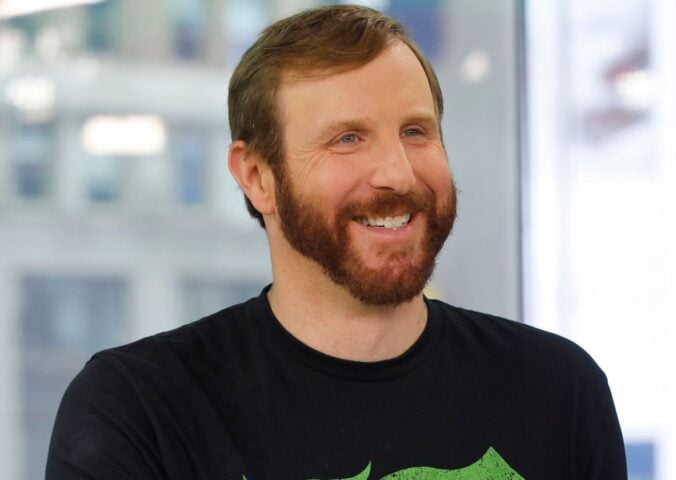Collagen is big business in the beauty world, with the global market valued at nearly USD $10 billion. Found in supplements, hair masks, and serums, collagen products purportedly have benefits including helping to restore youthfulness to skin and hair.
The human body naturally produces collagen, which is responsible for healthy joints and supporting blood clotting. But collagen production slows down as we age, and many people buy collagen products because they believe they reduce wrinkles.
Beauty brand FaceGym’s vegan Active Blast collagen booster has been getting glowing reviews after relaunching this year in plastic-free and more climate-friendly packaging. But the Active Blast is actually unusual in the collagen business for its eco-credentials.
Aside from being sourced from industries that exploit animals, collagen production has also been found to have environmental costs. Here’s how the global appetite for anti-ageing remedies is impacting animals and the planet.
What is collagen made from?
Collagen is a protein that the body makes from amino acids. In beauty and wellness products, the two main types come from cows and fish, known as bovine and marine collagen. It can also be sourced from pigs.
Bovine collagen is found in cows’ connective tissue, bones, cartilage, and skin – the latter of which is the source of most supplements available in stores. Marine collagen comes from the skin of fish as well as other sea animals such as jellyfish and sea cucumbers.
Collagen companies say that their supplements are natural and sustainable by-products of the beef and fishing industries. Vital Proteins, promoted in adverts by its Chief Creative Officer Jennifer Aniston, says that its marine collagen helps to reduce waste, and that its bovine collagen is “sourced from grass-fed, pasture-raised bovine.”
Bovine collagen and deforestation

Despite the healthy and sustainable image of collagen products, producing them from animals has been found to support, and even encourage, destructive practices.
An investigation released in March this year by the Guardian, Bureau of Investigative Journalism, Center for Climate Crime Analysis (CCCA), ITV, and Brazil’s O Joio e O Trigo in Brazil, uncovered links between collagen supply chains and Amazon deforestation.
Cattle ranching is the leading cause of deforestation in the Amazon, largely for beef. But the booming collagen industry means that, along with leather, collagen makes up an increasing portion of the profit made from cow carcasses.
The investigation found that some of the deforestation-linked collagen can be traced to Vital Proteins, which is owned by Nestlé. Yet marketing “grass-fed” and “pasture-raised” bovine collagen gives consumers the impression that this is a more ethical and natural choice than collagen from feedlot cattle.
Evidence of deforestation in beef supply chains has resulted in some companies making voluntary commitments to become deforestation-free. The European Union is also soon to ban the sale of some deforestation-linked products. But the collagen industry has so far avoided such scrutiny and is not obliged to track its environmental impacts.
Is marine collagen sustainable?
Demand for marine collagen also increasingly supports the fishing industry, which is depleting wild fish populations and degrading marine ecosystems. It has risen in popularity, with some in the beauty and wellness industries promoting it as superior to bovine collagen, as well as being suitable for people who don’t eat meat from land animals.
It is also marketed by manufacturers as more sustainable because it often comes from the skin of fishes who have been processed for food, thus reducing waste from fishing. But, as with bovine collagen, this could potentially provide a new revenue stream for seafood companies, making it more of a reason in itself for catching fishes.
Exploiting new species

The demand for high-quality collagen is also stimulating research into the best species for making beauty and wellness products. Collagen from sea cucumbers is a recent trend in the marine collagen industry, with proponents hailing its benefits for their skin. Several species of sea cucumber are already threatened or endangered due to being prized as a delicacy in some countries.
Fishing industry bycatch may become another target for the collagen industry. One study argues that “bycatch organisms, such as undersized fish, jellyfish, sharks, starfish, and sponges” which are rich in collagen could be used in addition to fishing industry waste. This could incentivize fishing vessels to keep non-target species that end up in their nets and lines as bycatch.
In fact, the US National Bycatch Reduction Strategy actively encourages the “increased utilization” of bycatch, “finding incentives and developing markets to help reduce economic discards and increase the portion of the catch that is landed and sold.” This suggests that instead of eliminating bycatch, it could be recategorized as part of the intended catch if markets develop to give it more economic value.
The growing popularity of marine collagen is also driving some companies to start farming fishes specifically to produce it. This will supposedly address concerns about the sustainability of harvesting wild fish from the oceans. But farming fish to feed people and livestock has already given rise to many other environmental and ethical problems.
Can collagen be vegan?
Plants do not produce collagen, but there are plant ingredients which can supposedly boost our collagen production. These include aloe vera, ginseng, and foods rich in vitamin C, which is said to support collagen production.
Vegan collagens that are the same as that produced in the human body are also being developed using yeast. FaceGym’s Active Boost is made with fermented yeast.
Other vegan collagen products have been on the market for a while. Mostly these are powders, gummies, and tablets made with ingredients which are supposed to stimulate collagen production.
Some popular options include Starpowa Vegan Collagen Support Gummies, Botanycl Skinclear Elixir Vegan with Coconut Oil Powder, and Bioglan Superfoods Beauty Protein.
Does collagen work?
Studies into the efficacy of collagen supplements for skin and joint health have shown some positive results. But the Harvard T.H. Chan School of Public Health warns that these studies have either been funded or partially funded by collagen companies or written by people with ties to the industry.
The Harvard School of Public Health also notes that it may not always be clear what collagen supplements contain, and in the US they are not reviewed for safety before being sold to consumers.
Other medical professionals say that it isn’t clear that there is any benefit to taking collagen supplements. They recommend eating more foods that contain the amino acids collagen is made from in the human body. Plant foods that contain these amino acids include legumes, tofu, and spirulina.






